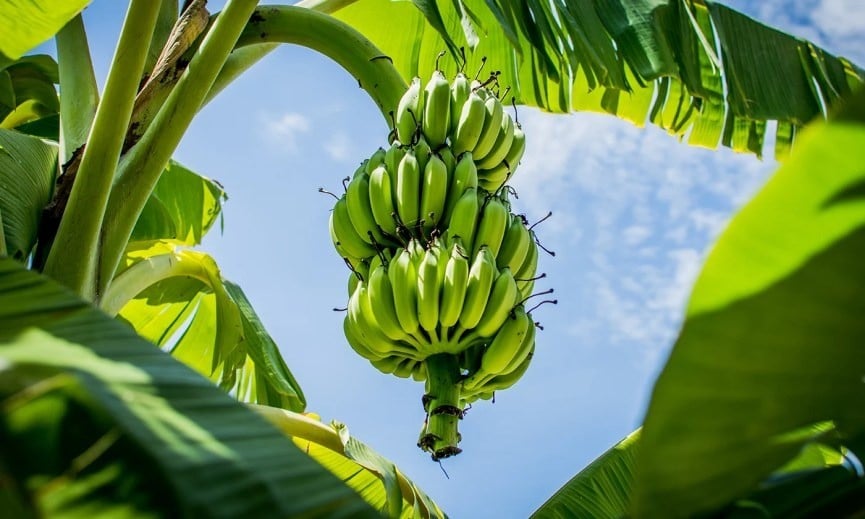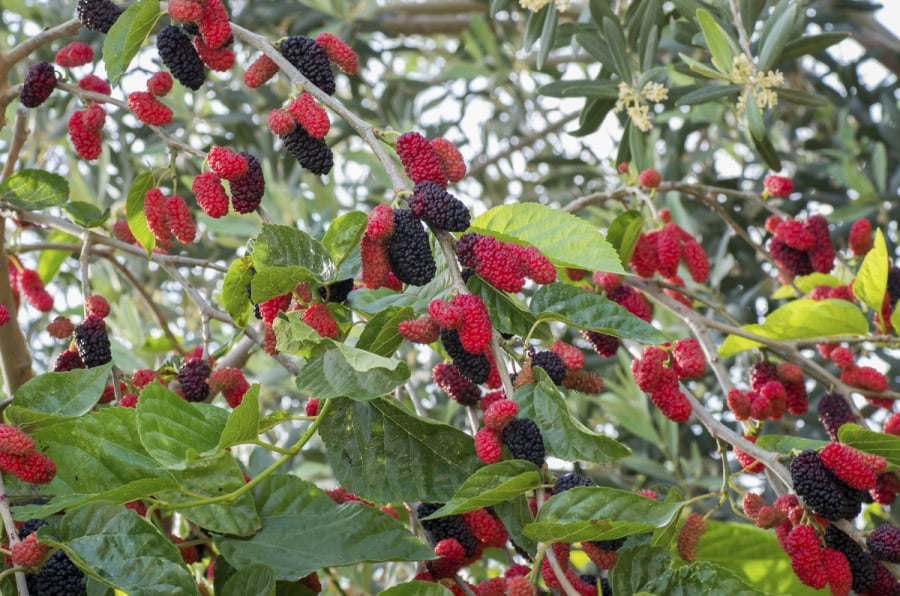For generations, Vietnamese people have believed that trees provide not only shade and food but also hold spiritual and feng shui significance. The elders used to advise, “Planting a tree is planting good fortune; preserving a tree is preserving prosperity.” In the gardens of ancient families, there were three types of trees that, once rooted, should never be cut down as they are believed to bring good luck, ward off calamities, and attract positive energy.
The following are three common yet profoundly meaningful trees that every family should carefully tend to and preserve.
1. Banana Tree – Leaves Unfold Fortune, Trunk Preserves Wellbeing
Beyond its ubiquitous presence in rural life, the banana tree is a highly regarded feng shui symbol by the ancients. The large, spreading leaves resemble open hands, inviting prosperity and peace. Traditionally, planting banana trees behind the house serves as a “screen,” protecting the family’s future, dispelling misfortune, and safeguarding the family’s wellbeing.
Despite its familiarity, the banana tree should not be planted haphazardly. Wealthy families often avoid planting banana trees in front of their houses, believing that the tree might block positive energy and hinder financial opportunities. Instead, the ideal location is at the back or side of the house, aligning with feng shui principles and ease of care.

Beyond its spiritual significance, the banana tree is a culinary and practical “treasure”: banana flowers are used in salads, the fruit is a rich source of potassium, the leaves are used for wrapping cakes, and the trunk provides animal feed. For less fortunate families, the banana tree symbolizes resilience, abundance, and sustenance.
2. Star Fruit (Carambola) Tree – Give and You Shall Receive, Sustaining Long-lasting Blessings
Strongly associated with the folk tale “Eating Star Fruit and Returning Gold,” the star fruit tree has long been considered a symbol of justice and karma. In folk culture, having a star fruit tree in one’s garden represents the act of giving and sharing, thereby accumulating blessings and virtue for future generations.
Many elders believe that families who preserve ancient star fruit trees, especially those deeply rooted over generations, will enjoy peaceful family lives, academic success for their children, and prosperous endeavors. The star fruit tree also serves as a “witness” to the family’s enduring legacy.
The star fruit tree is not just spiritually significant but also highly useful. The tart and sweet fruit can be used in various dishes, made into refreshing drinks, while its leaves, flowers, and roots are used in traditional medicine to reduce fever, fight inflammation, and treat coughs. Thus, the star fruit tree is a “multipurpose” plant, valued for its material benefits and symbolic meaning.
3. Mulberry Tree – Balancing Yin and Yang, Preserving Family Harmony
Often underrated for its aesthetic value, the mulberry tree is rarely chosen as an ornamental plant. However, in Eastern philosophy, the mulberry tree possesses unique abilities to expel evil spirits and balance Yin and Yang energies, creating a harmonious energy flow within the home.

In feng shui, the mulberry tree is believed to dispel negative energy and neutralize harmful forces, especially when planted in the northeast direction or in front of the house. For families facing challenges and financial instability, the mulberry tree acts as an invisible shield, protecting their livelihood and preserving familial harmony.
Beyond its spiritual significance, the mulberry tree is a valuable medicinal plant. Mulberry leaves make a refreshing tea, the fruit enriches the blood and improves sleep quality, while the bark and branches have analgesic and anti-inflammatory properties. In traditional Chinese medicine, the mulberry tree is considered a natural pharmacy for the family’s well-being.
In modern times, while some opt for expensive ornamental plants to decorate their homes in hopes of changing their fortunes, it is the humble banana, star fruit, and mulberry trees that truly bring enduring prosperity and blessings.
Unlock the Door to Wealth: 3 Things in Your Home That Attract Prosperity
“Stepping into a home that exudes an aura of prosperity and elegance is a dream come true for many. Imagine if your family could unlock the secrets to a life of abundance and luxury simply by embracing the power of three key elements within their living space. Discover the transformative impact these elements can have on your family’s journey towards a richer and more prosperous future.”
Is the Money Tree Bad Luck for These Two Zodiac Signs? Planting It Might Cause a Persistent Poverty, Washing Away All Your Wealth.
For those with clashing elemental signs, planting a money tree indoors could bring bad luck, according to Feng Shui masters. It is believed that the money tree, also known as the Pachira plant, can either attract wealth and prosperity or cause misfortune, depending on the homeowner’s elemental sign.






































